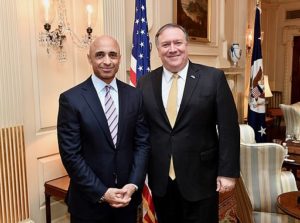Amb. Yousef Al Otaiba deserves a Nobel Peace Prize

U.S. Department of State from United States, Public domain, via Wikimedia Commons
In the coming months, the Norwegian Nobel Committee will collect nominations for recipients of the 2022 Nobel Peace Prize. There is probably no one more deserving of such an honor than Ambassador Yousef Al Otaiba, the UAE ambassador to the United States, for his role in facilitating the Abraham Accords.
The Abraham Accords, which had their first anniversary this week, marked the inception of a new era in the Middle East by concretizing a warm relationship between the Israeli, Emirati, and Bahraini peoples in a region historically fraught with conflict.
In the past year, ambassadors have been exchanged, and flights paths have been established. Israel and the UAE alone have struck 25 deals across 15 sectors, while trade has reached $500 million between the two nations and is expected to double in the next year.
Meanwhile, Bahrain and Israel just agreed on a framework for economic cooperation in July, which is expected to undergo review by the respective governments. The agreement encourages the free flow of goods, economic cooperation in the private sector, joint R&D activities and a system for the exchange of expertise and knowledge.
Al Otaiba was the brainchild of the normalization, beginning with a bold op-ed printed in Hebrew in Yediot Aharonot, warning against the application of sovereignty over parts of the Jordan Valley, including the possible exploitation of the situation by the inimical states of Turkey and Iran. Al Otaiba’s piece was the first op-ed by a Gulf diplomat to ever appear in an Israeli newspaper.
Al Otaiba’s epiphany: he saw normalization as the olive branch to halting Israeli sovereignty.
As Avi Berkowitz, former US special representative for international negotiations, told The Jerusalem Post last year that the Emirati ambassador was simply indispensable in the creation and conclusion of the accords. “He was the one who was in the weeds on every single detail, one of the main negotiators. The deal could not have happened without him.
“When you’re dealing with him, you know that you’re dealing with someone you can trust.”
Berkowitz continued to laud the diplomat’s creative, persistent style and sheer prowess. “He brought a very smart approach to things and people, but he’s also very practical. If something didn’t make sense, he was able to immediately find a creative solution. He was in the White House, probably about 30 times, leading up to this deal over the last few months and always with constructive solutions.”
And since their conclusion, the accords have been tested, proving to be far from a passing fad. This May, when war erupted in Gaza, the Abraham Accords countries lodged initial criticisms at Israel regarding Sheikh Jarrah and al-Aqsa Mosque, only to assume a more even-handed tone during the outbreak of large-scale violence.
As Yoel Guzansky, a senior research fellow at the Institute for National Security Studies, pointed out to Foreign Policy in June, the criticisms vis-à-vis Israel mostly amounted to rhetoric. “They [Abraham Accords countries] did nothing on the ground. They did not expel ambassadors or threatened to walk out of the accords or initiated intra-Arab negotiations.” And to the further credit of the governments, the streets of Dubai and Manama remained largely quiet.
Within weeks of the violence subsiding, Israeli and Emirati businessmen were convening at Dubai’s Global Investment Forum in June to discuss bilateral trade, while the Israeli and UAE governments concluded a double taxation avoidance treaty and the Emiratis invited the Israelis to join a free trade zone.
And there is an ongoing palpable excitement regarding the ongoing cultural exchange as well. In short, the accords remained untouched, speaking to the genuine substance of the arrangement itself – and the work Al Otaiba had put forth in ensuring its survival.
Al Otaiba did not merely stumble into such success. As has been noted, his efforts to cultivate a warmer relationship with Israel more generally have spanned several years.
In 2018, he shared a table with ambassador Ron Dermer at an event honoring US secretary of state Mike Pompeo, hosted by the Jewish Institute for National Security of America (JINSA). As President and CEO of JINSA Michael Makovsky told The Jerusalem Post in 2020, “He [Al Otaiba] told me before the dinner that this is the first time he’s been at a public event [with the Jewish community]. And I was very clear with him that Dermer was going to be there.” Makovsky added, “I didn’t know that meant there was going to be normalization within two years.”
The Nobel Peace Prize is a monumental honor that the international community chooses to bestow upon an individual or organization that has made a profound impact on the project of global peace.
In an area of the world replete with attempts at peace deals over many decades, with concomitant Nobel Prizes given, Ambassador Al Otaiba actually accomplished that which would have been deemed unthinkable just five years ago. In essence, a new Middle East has been created – and there is an individual that deserves to be properly recognized for that.
Sander Gerber is the CEO of Hudson Bay Capital Management, a distinguished fellow at JINSA, and a fellow at the Jerusalem Center for Public Affairs.
Originally published in The Jerusalem Post